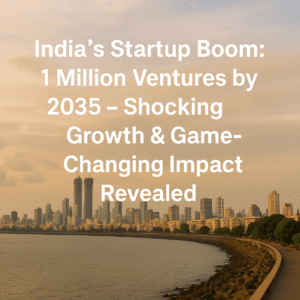India’s Startup Boom: 1 Million Ventures by 2035 – Shocking Growth & Game-Changing Impact Revealed
India’s startup ecosystem is set to explode from 2,000 ventures in 2015 to a staggering 1 million by 2035, driven by a “virtuous cycle” of innovation, exits, and reinvestments, according to Infosys co-founder Nandan Nilekani. Speaking at the Carnegie Global Tech Summit, he highlighted India’s decade-long digital transformation—Aadhaar, UPI, Reliance Jio, and demonetization—as foundational pillars enabling scalable, low-cost solutions.
Emerging sectors like climate tech, space exploration, and healthtech are now leading disruption, aligning with national goals such as net-zero emissions and healthcare accessibility. Despite momentum, challenges persist: uneven early-stage funding, regulatory hurdles, and talent retention in competitive markets. If achieved, this growth could elevate startups’ GDP contribution to 15-20% by 2035 and generate millions of jobs, positioning India ahead of the U.S. and China in startup density.
Experts emphasize frugal innovation and inclusivity as keys to success, urging expanded incubators in smaller cities, simplified regulations, and corporate investment in deep-tech fields. Nilekani’s vision underscores a future where India’s digital backbone and demographic energy fuel inclusive, global-scale entrepreneurship.

India’s Startup Boom: 1 Million Ventures by 2035 – Shocking Growth & Game-Changing Impact Revealed
At the Carnegie Global Tech Summit, Infosys co-founder and Aadhaar architect Nandan Nilekani unveiled an ambitious forecast: India’s startup ecosystem, which numbered just 2,000 ventures in 2015, is now on track to reach one million startups by 2035. This exponential growth—from 150,000 startups today—signals a transformative shift in India’s economic and technological landscape.
The Momentum Behind India’s Startup Surge
Nilekani credits this trajectory to a “virtuous cycle” of innovation, where successful exits, IPOs, and reinvestments create a self-sustaining engine. “When founders build successful companies, they unlock wealth, inspire new entrepreneurs, and fund the next wave of innovation,” he explained. For instance, the rise of unicorns like Flipkart and Paytm has spurred angel investments and mentorship, fostering a culture where one startup’s success catalyzes hundreds more.
Digital Foundations: The Bedrock of Disruption
India’s decade-long digital revolution laid the groundwork for this boom. Key milestones include:
- Aadhaar (2016): Enabled 1 billion+ Indians to access verified digital identities, streamlining KYC processes for fintech and e-commerce.
- Unified Payments Interface (UPI) (2016): Democratized digital transactions, processing over 12 billion monthly transactions in 2024.
- Reliance Jio (2016): Slashed data costs, bringing 800 million+ Indians online and fueling tech-driven business models.
- Demonetization (2016): Accelerated digital payment adoption, with UPI now dominating 85% of India’s retail transactions.
These innovations lowered entry barriers, allowing startups to scale rapidly with minimal infrastructure costs.
Sectors Poised for Disruption
While fintech and e-commerce dominated early waves, Nilekani highlighted emerging opportunities:
- Climate Tech: Aligned with India’s net-zero 2070 goal, startups are innovating in renewable energy, carbon capture, and sustainable agriculture.
- Space Tech: Post-ISRO’s privatization push, ventures like AgniKul Cosmos are democratizing satellite launches and space exploration.
- Healthtech: Post-pandemic, telemedicine and AI-driven diagnostics are addressing rural healthcare gaps.
Challenges on the Path to 1 Million
Despite optimism, hurdles remain:
- Funding Gaps: While Series A+ funding thrives, 60% of early-stage startups struggle to secure seed capital outside metros.
- Regulatory Complexity: Cumbersome compliance processes and shifting policies deter deep-tech and biotech ventures.
- Talent Wars: With 1.5 million engineers graduating annually, retaining skilled workers amid global competition is critical.
Global Context and Economic Impact
India’s projected 1 million startups would surpass the U.S. and China’s current counts (600k and 1.1 million, respectively). This growth could contribute 15-20% to India’s GDP by 2035, up from 5% today, while creating 10-12 million jobs.
Expert Insights
Rajan Anandan, Managing Director of Peak XV Partners, notes, “India’s ecosystem thrives on frugal innovation—solving complex problems at 1/10th of global costs.” Meanwhile, Meena Ganesh, CEO of Portea Medical, emphasizes, “The next decade belongs to startups addressing sustainability and inclusivity.”
The Road Ahead
To sustain momentum, stakeholders advocate for:
- Expanding incubators to Tier-2/3 cities.
- Simplifying GST and labor laws for early-stage firms.
- Incentivizing corporate venture capital in sectors like semiconductors and AI.
Nilekani’s vision hinges on India leveraging its digital backbone and demographic dividend. As he concluded, “We’re not just building startups—we’re architecting the future of inclusive growth.”
You must be logged in to post a comment.